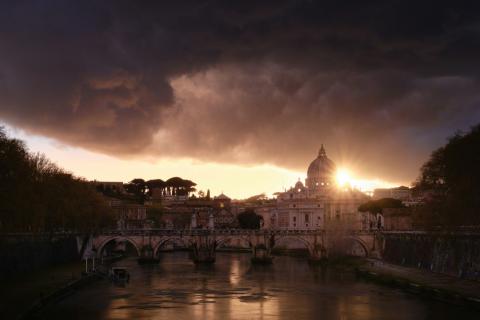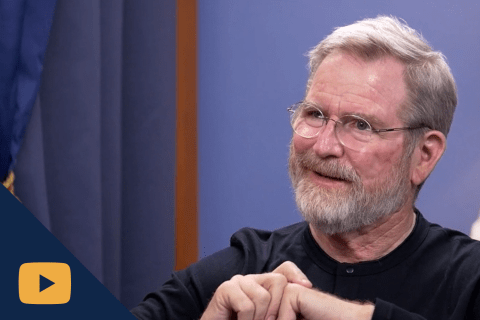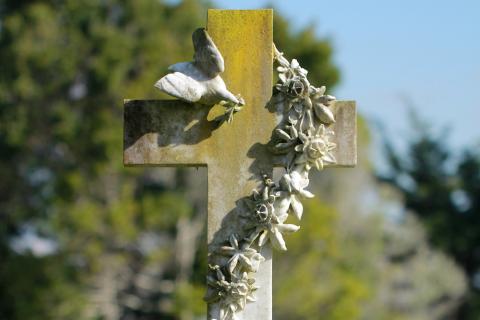
The following address was delivered by Dr. David Tamisiea, Dean of the School of Arts and Sciences at the University of Mary, on September 13, 2022.
Many of you students have only a vague notion of what a Dean is, and what a Dean does. When I was an undergraduate student at the University of Notre Dame in the 1980’s, I thought that the Dean was the person on campus whom you went to see when you were in big trouble. Here you were, just living your life, going to college, having a good time, and the Dean was there to make sure you did not have too good of a time. From my perspective as a student, the Dean was kind of a Kill Joy, so hearing the words, “the Dean wants to see you,” sent chills down your spine, and probably meant you were in some kind of trouble, and you better call Dad and Mom right away. In fact, I think even some of my own faculty sometimes have a sense of foreboding when they get word, “the Dean wants to see you.”
But I am not that kind of Dean, neither by temperament nor by office. As the Academic Dean of the School of Arts and Sciences, my role is not to be a watchdog over student behavior, but rather to be a kind of shepherd who oversees all the faculty and programs in our school, so that we are at our very best in teaching and forming you students, advancing knowledge through our faculty’s scholarly and creative work, and providing various forms of service outside the classroom. And so, instead of being a kind of Kill Joy, tonight, at least, I would like as your Academic Dean to exhort you to embrace a certain kind of Joy, the Joy of Learning. And so the title of my address is “The Love of Learning, and the Desire for God: A Path to Joy.”
Some of you may recognize that I have borrowed the title of my talk from the celebrated twentieth-century book by the Benedictine monk and medievalist, Fr. Jean Leclercq, entitled The Love of Learning and the Desire for God. In this work, Leclercq examines the development of Western monastic literary culture from its beginnings in Benedictine monasticism in the sixth century until its peak in the twelfth century with the onset of scholasticism. According to Leclercq, the medieval monk typically applied himself to copying, preserving, reading, and studying the great works of pagan antiquity purely as a means to assist his meditation and study of Sacred Scripture and the Church Fathers. In Leclerq’s view, monks studied the ancient pagan Latin authors, whose works made up the subject matter for the classical Liberal Arts, not for their own sake, but solely as a means to become skilled at reading, writing, and interpreting the Bible and the Fathers. Thus, the monks preserved, read, and studied ancient Latin pagan authors like Virgil (poet), Ovid (poet), Horace (poet), Terence (playwright), Cicero (philosopher), Lucretius (philosopher), Seneca (philosopher, playwright), and others, to gain literary skills to serve their monastic way of life. In Leclercq’s view, secular learning was strictly an effective means monks used to enhance their search for God but not an end in itself.
While I agree with Leclercq’s historical account of the development of Western monastic literary culture on a surface level, I think there must have been something deeper going on in the monks’ love of secular learning that directly corresponds to their search for God, even if only at an implicit and unconscious level. It’s this “deeper something” that, I think, quite naturally led the cathedral and monastic schools in the Early Middle Ages to evolve into the first Catholic universities in the High Middle Ages, where the monastic search for wisdom and holiness expanded to include the scholastic pursuit of science and scholarship. I am not a medievalist, so I have no intention of examining this historical development, but rather I wish to develop the idea that there is, at least in principle, a deep intrinsic correspondence between the love of learning for its own sake and the search and love for God.
My apologies for turning autobiographical again, but it relates to the main point. When I was an undergraduate student, my approach to education was very much a mercenary affair. I grew up with the idea that the primary purpose of a college education is to obtain the knowledge and skills necessary for a successful professional career. So, for example, even though I loved English and literature in high school, the notion of majoring in English in college because I enjoyed it was so foreign to me that it was not even a consideration in choosing my course of study: I thought you go to college to pursue a professional career, and so that is what I did. I declared pre-professional studies as my major and planned on going to medical school. My faith, I should add, was also somewhat instrumentalized at this time of my life. I sought God, on my own terms, mostly to ask for his help when I needed him most. Even though I did not end up going to medical school, I did go to law school and became a successful attorney with a thriving law practice.
Along the way, though, before law school I committed to full-time volunteer work for a year as a Holy Cross Associate working with disadvantaged youth in a poor area in the Phoenix area, where I also volunteered at a Catholic Worker House that served the homeless. It was there that I discovered a community of other young adult Catholics totally devoted to God and to learning for its own sake. When we were not doing our service work, we would gather for Mass and then afterward discuss some work we chose to read together – works like Dorothy Day’s The Long Loneliness, Dostoyevsky’s Brothers Karamazov, Martin Luther King’s Letter from a Birmingham Jail, essays by G. K. Chesterton, and the like. The bottom line is we were dedicated to learning as an end in itself, and I discovered real joy in this. Even after becoming a lawyer, as my relationship with God deepened so did my love for learning. As my faith grew, at the same time I became an insatiable reader of all kinds of works in theology, philosophy, history, and literature. My love for God and my love for learning both grew and ran on parallel tracks. Eventually, my search for God and love for learning led me to make the decision to leave my career in law to pursue graduate studies in theology.
Now let me stop myself right now before going any further. I recognize that I cannot universalize my own unique experience of a love for learning and a love for God growing in tandem and assert that this applies to everyone else. There are many people who love learning but could care less about God, and others who have a deep love for God but have no interest in the life of the mind. Correlation is not causation, so nothing I have said so far proves that when one grows in love for God it necessarily entails a growth in love for learning. So far, it’s just my story. And yet, I would like to make the case that, ordinarily and typically, there is a natural and intrinsic connection between the desire for God and the love of learning, and so that is what I would like to examine now.
St. John Paul II alludes to the inherent connection between the things we study and the God we seek in the opening paragraph of his apostolic constitution on Catholic universities, Ex corde Ecclesiae, where he says “[it is] a Catholic University’s privileged task to unite existentially by intellectual effort two orders of reality that too frequently tend to be placed in opposition as though they were antithetical: the search for truth, and the certainty of already knowing the fount of truth” (Ex corde Ecclesiae 1). And so on the one hand, at a university we seek to discover the truth about the things we study – our learning could be described as “truth-seeking.” At the same time, all the things we study, all reality itself, is ultimately grounded in the mind of God, the source and foundation of all being and truth.
But lest I get ahead of myself, what is truth? St. Thomas Aquinas gives us the classic definition of truth as the “adequation of the mind to the real” (De veritate q. 1, a. 1, 3, 5, 8; q. 16, a. 1.). When the mind’s understanding or knowledge of something corresponds to reality, to the way the thing really is, the mind possesses the truth about the thing. Conversely, when the mind’s grasp of something is distorted, and does not match what the thing really is, the mind does not possess the truth, but rather is in error. Truth, then, is the intellect’s conformity to reality.
But how does truth relate to God, and even more precisely, why do we call him Truth itself? Why do we claim God is the source and foundation of all truth? While for us, truth is in the human mind insofar as it corresponds to objective reality, objective reality in turn corresponds to the mind of God who created all things that make up that reality. As Aquinas puts it, “God’s own act of understanding is the measure and cause of every other being” (Summa theologiae I, q. 15, a. 5). Thus, truth is ultimately and primarily in the mind of God as the creator of all things that exist, and therefore he is rightly called the font of all truth, or Truth itself.
Another way of seeing this connection between the things we learn and the God we love is the theological doctrine of the divine ideas, first proposed by St. Augustine and then developed further by Aquinas. The doctrine of the divine ideas is simply that every being that exists in reality first exists in the mind of God as an eternal idea that God, in time, creates and brings into existence. Just as an architect has an idea of the house before he builds it, God the Divine Architect has an eternal idea of every existing thing before he creates each of them. Because all things that exist are first found in the mind of God according to his eternal mode of being, every existing thing is therefore a dim manifestation and reflection of its maker. As Aquinas puts it, “every creature has its own form, according to which it participates in some degree in likeness to the divine essence” (Summa theologiae I, q. 15, a. 2). Another way Aquinas gets at this is to say that all perfections of being found in creatures are found in God but in a more eminent way according to his eternal and divine mode of being (Summa theologiae I, q. 4, a. 2).
This, then, I think, is the connection between man’s love of learning and his desire for God. When we learn and discover the truth about created things, we encounter in them traits and perfections that are dim reflections, expressions, and manifestations of God their maker. This is the “deeper thing” I think Leclercq misses in his account of monastic literary culture in the early Middle Ages. This is also why, I think, the university as an institution devoted to the pursuit of “universal knowledge,” quite naturally grew out of the monastic and cathedral schools. This too, I think, explains in part why the Catholic Church is, and always has been, deeply committed to learning and education, because it goes hand-in-hand with our search and love for God. When we learn about the created things of the world, we in some way encounter God, not in a pantheistic way as if God is part of these things, but rather as distant reflections of God and his perfections. For as the Psalmist says, “The heavens declare the glory of God; [and] the skies proclaim the work of his hands” (Psalm 19:1).
And this learning gives us joy! St. John Paul II emphasizes the joy of learning in Ex corde Ecclesiae when he turns to Augustine to say that a Catholic university is a privileged place for joy in the truth, saying: “With every other university, a [Catholic university] shares that gaudium de veritate so precious to Saint Augustine, which is that joy of searching for, discovering, and communicating truth in every field of knowledge” (Ex corde Ecclesiae 1). When one examines this celebrated phrase gaudium de veritate or “joy in truth” in its fuller context in the Confessions, one sees that Augustine himself connects the joy found in discovering truth to the search for God who is Truth, saying: “Indeed, the blessed life consists in the joy that comes from the truth (gaudium de veritate), since this joy comes from You who are Truth, O God, my light, the salvation of my person, my God. Everyone wants this blessed life, the only kind of life that is blessed – everyone wants it. And everyone wants the joy of truth.” (Confessions X.23).
A Catholic university then is a privileged place to discover joy in the truth. Why does learning and discovering truth give us joy? The reason we find joy in learning and discovering truth is because we are made for the truth, and because we are made for God, who is the source of all truth. Aristotle famously states in the first line of the Metaphysics a very simple but profound truth: “All men by nature desire to know” (Metaphysics I.1). We as human beings are unique amongst all material creatures insofar as we have minds that give us the ability to know and understand universal truth. Because we are constituted by God as rational animals, we cannot help but be truth-seekers: We naturally want to know and understand the truth, that is, “the way things really are.” Our natural inclination toward truth is evident in our pursuit of knowledge in all the arts and sciences, but it is even in some manner manifest in our gravitation toward modern media, such as cable television, the internet, and smartphones. These devices are so enticing because they provide a steady stream of information that, in often unhealthy ways, feeds into our natural desire to know. As human beings, we cannot help it: we naturally desire to know and understand the truth about reality.
St. Thomas Aquinas, commenting on the first line of Aristotle’s Metaphysics, explains that the primary reason why man naturally desires to know truth is that “each thing naturally desires its own perfection.” We naturally desire to know because knowing and understanding truth is perfective or fulfilling of us as rational human beings. This is especially the case in regard to our knowledge about God. Truth is literally food for the soul; without it, that which is highest in us, our reason, suffers a kind of death by starvation.
Now let me guess what some of you students might be thinking – I don’t always find joy in learning – it’s hard and stressful and even exhausting at times. I get it, we all experience this. It has to be acknowledged that there are limitations upon our capacity for truth and the joy to be found in it. Our intellectual abilities are circumscribed by age, education, native intelligence, and the like. Moreover, our natural ability to know the truth is hampered by our fallen nature: we are often resistant, lazy, dull, or neglectful in seeking to know truth. But despite these obstacles and limitations, we must realize that our rational, God-given design and nature as human beings is nevertheless ordered to knowing the truth and knowing God.
So here is my challenge and exhortation: do not make your education a purely mercenary affair like I did as an undergraduate student so many years ago. Recognize that in your studies in science and math and philosophy and literature – and not just theology – there are subtle and implicit ways in which you are indirectly encountering God. Recognize too that the more you love God the more you can grow in your love for understanding the things made by him. Commit yourselves both to learning in your studies and to growing in your relationship with God so that you may discover the joy you were made for.


